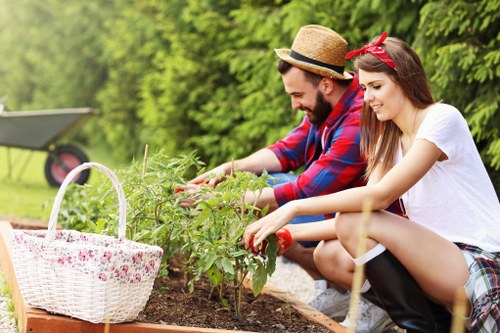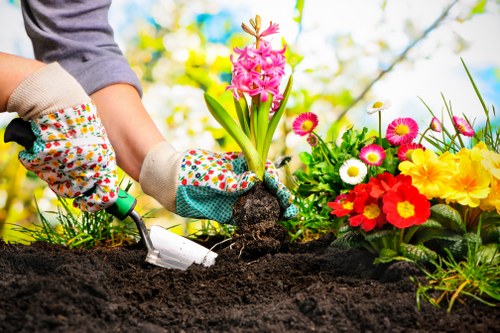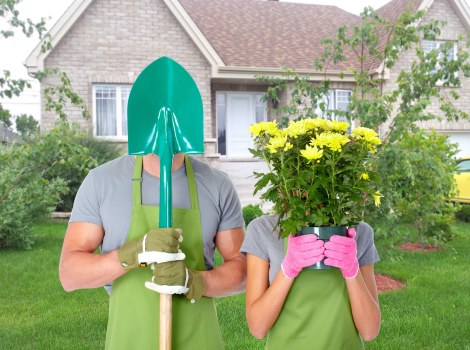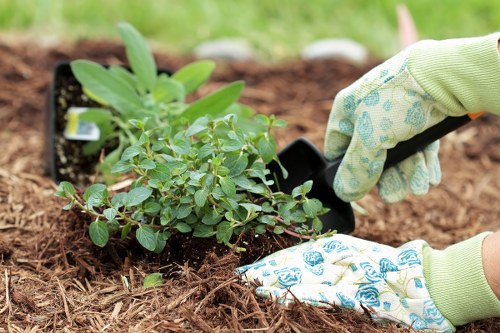Comprehensive Garden Maintenance Services in Sherwood
Introduction to Garden Maintenance

Maintaining a beautiful garden requires dedication, knowledge, and the right resources. In Sherwood, homeowners and garden enthusiasts alike understand the value of a well-kept garden, not just for aesthetic appeal but also for enhancing the overall property value.
Garden maintenance encompasses a variety of tasks, from regular mowing and pruning to more specialized services like soil testing and pest control. Whether you're a seasoned gardener or a novice, having a structured maintenance plan is crucial for a thriving garden.
In this article, we'll explore the essential aspects of garden maintenance in Sherwood, providing you with the insights and tips needed to keep your garden in top shape all year round.
Essential Garden Maintenance Tasks

Proper garden maintenance involves a series of tasks that should be performed regularly to ensure the health and beauty of your plants. Here are some key maintenance activities:
- Weeding: Regular removal of weeds prevents them from competing with your plants for nutrients and water.
- Pruning: Cutting back overgrown branches and stems helps promote healthy growth and improves plant shape.
- Watering: Consistent and appropriate watering is essential, especially during dry spells.
- Fertilizing: Providing the right nutrients ensures your plants grow robustly and stay healthy.
- Pest Control: Identifying and managing pests early can prevent significant damage to your garden.
Seasonal Maintenance Tips

Different seasons bring unique challenges and opportunities for garden maintenance. Adapting your maintenance routine to each season can help your garden thrive throughout the year.
Spring
Spring is a time of renewal. It's the perfect time to prepare your garden for the growing season ahead.
- Planting: Start planting new flowers, vegetables, and shrubs as the weather warms.
- Soil Preparation: Test and amend the soil to ensure it's rich in nutrients.
- Pruning: Trim back any dead or damaged branches from perennial plants.
Summer
Summer maintenance focuses on keeping plants healthy and thriving during the hot months.
- Watering: Ensure consistent watering, especially during dry periods.
- Mulching: Apply mulch to retain moisture and suppress weeds.
- Pest Management: Monitor for pests and treat infestations promptly.
Autumn
Autumn is ideal for preparing your garden for the winter months.
- Leaf Removal: Clear fallen leaves to prevent mold and diseases.
- Planting Bulbs: Plant spring-flowering bulbs before the first frost.
- Pruning: Cut back perennials and tidy up garden beds.
Winter
Winter maintenance ensures your garden remains protected and ready for the next growing season.
- Protection: Cover sensitive plants to shield them from frost.
- Tool Care: Clean and store gardening tools properly.
- Planning: Plan for next year's garden layout and plant selections.
Choosing the Right Plants for Sherwood

Selecting plants that thrive in Sherwood's climate and soil conditions is vital for a successful garden. Consider the following factors when choosing your plants:
- Climate Compatibility: Ensure plants are suited to Sherwood's weather patterns, including temperature ranges and rainfall.
- Soil Type: Test your soil to determine its pH and nutrient levels, then choose plants that prefer those conditions.
- Sunlight Exposure: Match plants to the amount of sunlight different parts of your garden receive.
- Maintenance Requirements: Choose plants that align with the amount of time and effort you can dedicate to garden maintenance.
Popular Plant Choices
Some plants that perform well in Sherwood include:
- Roses: Hardy and versatile, roses add beauty and fragrance to gardens.
- Lavender: Known for its lovely scent and low maintenance needs.
- Hostas: Ideal for shady areas, hostas offer lush foliage and vibrant flowers.
- Boxwood: Perfect for creating structured hedges and borders.
- Perennials: Plants like daisies and daylilies provide color year after year.
Tools and Equipment for Effective Garden Maintenance

Having the right tools can make garden maintenance tasks easier and more efficient. Here are some essential tools every gardener in Sherwood should consider:
- Pruning Shears: For trimming and shaping plants with precision.
- Lawn Mower: Keeps your grass neat and well-maintained.
- Hedge Trimmers: Essential for shaping hedges and shrubs.
- Garden Fork: Helps in turning and aerating the soil.
- Watering Can or Hose: Ensures your plants receive adequate moisture.
Investing in high-quality tools not only makes maintenance tasks easier but also ensures they last longer, saving you money in the long run.
Regular Maintenance: Establish a routine to keep your garden in optimal condition.
Professional Garden Maintenance Services in Sherwood

While DIY garden maintenance is rewarding, sometimes enlisting professional help can make a significant difference, especially for larger or more complex gardens. Professional garden maintenance services in Sherwood offer a range of solutions tailored to your specific needs.
Benefits of Hiring Professionals
- Expertise: Professionals bring extensive knowledge of plant care, pest management, and garden design.
- Time-Saving: Outsourcing maintenance tasks frees up your time for other activities.
- Consistent Results: Professionals ensure that your garden remains consistently well-maintained throughout the year.
- Advanced Equipment: Access to specialized tools and machinery not typically available to homeowners.
Services Offered
Typical services provided by garden maintenance companies in Sherwood include:
- Lawn Care: Mowing, fertilizing, aerating, and pest control.
- Planting and Pruning: Selection, placement, and regular trimming of plants and shrubs.
- Landscape Design: Creating aesthetically pleasing and functional garden layouts.
- Seasonal Cleanup: Preparing gardens for different seasons with appropriate maintenance tasks.
- Hardscaping: Installation and maintenance of patios, paths, and other non-plant elements.
Contact us today to schedule professional garden maintenance services and ensure your Sherwood garden remains a stunning oasis all year round.
Local Climate and Its Impact on Garden Maintenance

Sherwood's climate plays a crucial role in determining the best practices for garden maintenance. Understanding the local weather patterns helps in planning and executing maintenance tasks effectively.
Temperature Variations
Sherwood experiences a temperate climate with distinct seasons. Summers can be warm and dry, while winters are cold with occasional frost. These variations affect plant growth cycles and maintenance requirements.
Rainfall and Irrigation
Average rainfall in Sherwood is moderate, but periods of drought can occur, especially during summer months. Implementing efficient irrigation systems and water management practices is essential to maintain healthy gardens.
Soil Conditions
The soil in Sherwood varies, ranging from sandy to clay-heavy in different areas. Conducting soil tests can help determine the right amendments and fertilizers needed to support plant health.
Eco-Friendly Garden Maintenance Practices

In today's environmentally conscious world, adopting eco-friendly garden maintenance practices is more important than ever. Sustainable gardening not only benefits the environment but also promotes healthier plant growth.
Composting
Creating compost from kitchen scraps and garden waste enriches the soil naturally, reducing the need for chemical fertilizers.
Rainwater Harvesting
Collecting rainwater for irrigation minimizes water wastage and ensures your plants receive clean, fresh water.
Organic Pest Control
Using natural predators and organic pesticides helps manage pests without harming beneficial insects or the ecosystem.
Native Plants
Incorporating native plant species supports local wildlife and requires less maintenance, as they are well-adapted to Sherwood's climate.
- Reduce Chemical Use: Limit the use of synthetic fertilizers and pesticides.
- Mulching: Use organic mulches to retain soil moisture and suppress weed growth.
- Energy-Efficient Tools: Opt for manual or electric gardening tools over gas-powered ones to reduce emissions.
Adopting these practices not only creates a healthier garden but also contributes to the overall well-being of the environment.
10-15 Closest Areas to Sherwood for Garden Maintenance Services

Sherwood is surrounded by several charming areas that also benefit from professional garden maintenance services. Understanding the proximity and unique features of these areas can help residents choose the best service providers.
- Briarwood: Located just 2 miles east, Briarwood offers lush landscapes perfect for detailed gardening.
- Maple Grove: 3 miles north, known for its diverse plant species and community gardens.
- Willow Creek: Situated 4 miles south, featuring scenic water features and vibrant floral displays.
- Oak Ridge: 5 miles west, famous for its mature trees and expansive lawns.
- Pinehill: 6 miles northeast, ideal for evergreen plant maintenance and winter care.
- Cedar Valley: 7 miles southeast, offers specialized services for vegetable and herb gardens.
- Elmwood: 8 miles northwest, known for its ornamental gardens and decorative plantings.
- Birchwood: 9 miles southwest, with a focus on sustainable and eco-friendly gardening practices.
- Hawthorne: 10 miles east, catering to both residential and commercial gardens.
- Rosemont: 11 miles north, popular for its rose gardens and flowering shrubs.
- Silver Lake: 12 miles south, featuring waterfront gardens and aquatic plant care.
- Greenfield: 13 miles west, known for its expansive green spaces and community parks.
- Sunnyvale: 14 miles northeast, offering services for sunny and drought-resistant gardens.
- Lakeview: 15 miles southeast, perfect for gardens with water elements and shade-loving plants.
Each of these areas has its unique gardening needs and characteristics, making it essential to choose a garden maintenance service that understands local conditions and preferences.
Book your service now and ensure your garden receives the attention and care it deserves, whether you're in Sherwood or one of the nearby areas.
Common Gardening Challenges in Sherwood and How to Overcome Them
Gardening in Sherwood comes with its own set of challenges. Being aware of these issues and knowing how to address them can significantly improve your garden's health and appearance.
Pest Infestations
Pests such as aphids, slugs, and caterpillars can wreak havoc on your plants. Implementing integrated pest management (IPM) strategies can help keep these pests under control.
- Biological Control: Encourage natural predators like ladybugs and birds.
- Physical Barriers: Use nets and traps to keep pests away from plants.
- Organic Pesticides: Apply eco-friendly pesticides as a last resort.
Weed Control
Weeds compete with your plants for nutrients and water. Regular weeding and the use of mulch can effectively manage weed growth.
Soil Health
Healthy soil is the foundation of a thriving garden. Regular soil testing and the addition of compost and organic matter can improve soil structure and fertility.
Water Management
Overwatering and underwatering are common issues. Installing drip irrigation systems and using mulch can help maintain optimal moisture levels.
Climate Extremes
Extreme temperatures can stress plants. Selecting resilient plant species and providing adequate shelter or shade can mitigate these effects.
Innovative Garden Maintenance Techniques
Advancements in gardening technology and techniques have made garden maintenance more efficient and effective. Here are some innovative approaches gaining popularity in Sherwood:
Smart Irrigation Systems
Automated irrigation systems equipped with sensors can adjust watering schedules based on weather conditions and soil moisture levels, ensuring plants receive the right amount of water.
Vertical Gardening
Maximize space by growing plants vertically using trellises, wall-mounted planters, or stacked pots. This technique is especially useful for small gardens or urban settings.
Hydroponics
Growing plants without soil using nutrient-rich water solutions can increase yield and reduce water usage. This method is ideal for indoor gardens and controlled environments.
Permaculture
Designing gardens based on natural ecosystems promotes sustainability and reduces the need for external inputs. Permaculture emphasizes the use of perennial plants, companion planting, and resource recycling.
Organic Gardening
Focusing on organic practices, such as using natural fertilizers and pest control methods, supports a healthier environment and produces chemical-free produce.
Garden Automation
From robotic lawn mowers to automated lighting systems, garden automation can handle routine tasks, allowing gardeners to focus on more creative aspects.
- Benefits: Increased efficiency, reduced labor, and enhanced precision in maintenance tasks.
- Considerations: Initial investment costs and the need for technical knowledge.
Integrating these innovative techniques can transform your garden maintenance routine, making it more sustainable and enjoyable.
DIY vs. Professional Garden Maintenance
Deciding between DIY garden maintenance and hiring professionals depends on various factors, including time, expertise, and the size of your garden.
DIY Maintenance
Taking care of your garden yourself can be rewarding and cost-effective. It allows you to have complete control over the maintenance processes and fosters a deeper connection with your garden.
- Pros: Cost savings, personal satisfaction, flexibility in scheduling.
- Cons: Time-consuming, requires knowledge and skills, potential for errors.
Professional Maintenance
Hiring professionals ensures high-quality maintenance with minimal effort on your part. Professionals bring expertise and efficiency, especially for complex or large gardens.
- Pros: Expertise, time-saving, consistent results, access to advanced tools.
- Cons: Higher costs, less personal involvement in the process.
Hybrid Approach
Many gardeners find a hybrid approach works best—handling some tasks themselves while outsourcing more complex or time-consuming ones to professionals.
Enhancing Garden Aesthetics
Aesthetics play a significant role in garden maintenance. Creating an attractive garden involves thoughtful planning and attention to detail.
Garden Design Principles
- Balance: Distribute elements evenly to create a harmonious look.
- Contrast: Use varying colors, textures, and shapes to add interest.
- Unity: Ensure all elements work together cohesively.
- Focal Points: Highlight specific areas or features to draw attention.
Color Coordination
Selecting a color palette that complements your home and surroundings can enhance garden beauty. Consider seasonal color changes and plant bloom times for continuous vibrancy.
Pathways and Structures
Incorporating pathways, pergolas, arbors, and garden sculptures adds structure and character to your garden.
Lighting
Strategic lighting can highlight garden features, provide safety, and extend garden enjoyment into the evening hours.
Water Features
Fountains, ponds, and streams introduce a soothing element and can attract wildlife, adding to the garden's charm.
- Maintenance Tips: Regularly clean and maintain water features to prevent algae growth and ensure proper functioning.
- Placement: Position water features where they can be easily enjoyed and complement other garden elements.
By focusing on these aesthetic elements, you can create a garden that is not only functional but also a beautiful sanctuary.
Sustainable Gardening Practices
Sustainability in gardening ensures that your practices are environmentally friendly and contribute to the well-being of the ecosystem.
Using Native Plants
Native plants are adapted to the local climate and soil, requiring less water and maintenance while supporting local wildlife.
Composting
Recycling garden and kitchen waste into compost enriches the soil and reduces landfill waste.
Rainwater Harvesting
Collecting rainwater conserves water and provides a natural irrigation source for your garden.
Integrated Pest Management
Combining biological, physical, and chemical methods to manage pests minimizes environmental impact.
Energy-Efficient Tools
Using electric or manual gardening tools reduces carbon emissions compared to gas-powered alternatives.
Reducing Chemical Usage
Opt for organic fertilizers and pesticides to maintain soil health and protect beneficial insects.
- Benefits: Healthier plants, reduced environmental footprint, cost savings.
- Implementation: Start small by incorporating one sustainable practice at a time.
Adopting sustainable gardening practices not only benefits your garden but also contributes to a healthier planet.
Conclusion: Achieving a Beautiful Garden in Sherwood

Maintaining a beautiful and healthy garden in Sherwood is a rewarding endeavor that requires planning, dedication, and the right resources. By understanding the essential maintenance tasks, choosing appropriate plants, utilizing the right tools, and adopting sustainable practices, you can create a garden that enhances your property's beauty and provides a peaceful retreat.
Whether you prefer to handle maintenance yourself or enlist the help of professionals, the key is consistency and attention to detail. Remember to consider Sherwood's unique climate and soil conditions, and don't hesitate to reach out to local garden maintenance services for expert assistance.
Contact us today to begin your journey towards a stunning and well-maintained garden in Sherwood.
